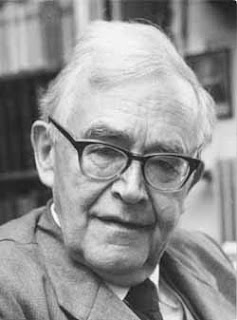 Chris Tilling
Chris Tilling posted recently on the relation of tradition to scritpture within the Church. He made the following quote from Perriman's book
Otherways:
'Scripture is like a forest. As people explore the forest, they tend after a while to follow the paths that others have taken, simply because it's easier. So the paths get well-worn and eventually become the definitive and orthodox way of getting around the forest. In fact the paths have become so well established that people have produced maps, which has led to the phenomenon of people staying at home with their maps and never feeling the need to venture into the forest at all ... It would be nice, in a way, if we could leave the forest alone for a while, let the undergrowth regrow, let the old paths disappear, and then start again, so that we come to know the forest for the first time' (9)
I note in hindsight that in the highlighted text Perriman says "in a way", qualified with "for a while." Considering that I haven't read the book, my extended response may have been an over-reaction. But seeing as it took me a while, I thought I'd post it here (you can read the ensuing dialogue
here).
. . .
I appreciate where Perriman is coming from - trying to stay awake to the particularity of the text and the implications of this particularity for our faith - but I think he needs to get clear on the nature of Christian faith itself first, before priviliging the Bible over tradition (how pretentious do I feel when I say that! Oh well). Here are my responses to comments:
From the previous post, Chris said:
But this makes me feel like Perriman's project runs the risk of neglecting the interpretive tradition of the church, and its central creedal statementsI think the risk is greater, it concerns the nature of Christian faith itself. Christian faith is not, in the first instance, about reading the Bible faithfully. It's a response to the Gospel, the God's work and word in Christ to which the four canonical Gospels only witness. They are not the Gospel themselves, they are signposts to the reality that preceded them, encompasses them and grasps us to make us want to read them in the first place.
This distinction between Gospel and text means that theological exegesis
requires the paths in the forest, it requires tradition, for without the creedal summaries of the Church (which I define broadly, including Billy Graham's little pamphlets) we wouldn't know why we are reading and what we are reading for. The problem with the Pharisees was not that they were somehow lacking in a pre-traditional, un-mediated reading of the text but that they hadn't grasped the true substance of the text. Neither did the disciples, despite the fact that they knew the text's Substance personally on a daily basis. It took the post resurrection encounter with the extra-textual living Christ and the anointing of the Holy Spirit to open their eyes and to see what had been in the text all along. This extra-textual event "opened up" the text's true meaning (it's "spiritual" rather than "literal" meaning, to use patristic categories). It was because of this vision that the church was capable of reading the Hebrew Bible as the Old Testament in the first place. Paul's hermeneutic, so scandalous to the historical-critical mind, was informed by this understanding of what had really been going on all the time (in seiner Exegese, er hat den Text
verstanden, wenn nich
erklärt, to use Dilthey's categories). It didn't matter how well or sensitively he read his Bible, without meeting Jesus he wouldn't have grasped the Bibles true meaning.
Thus, if "tradition" is understood to be a systematic formulation of the essence of Christian faith, then tradition is not only helpful to exegesis, it is necessary. I don't know how we'd read the Old Testament otherwise.
Which is why I disagree with Perriman's statement that
[Tradition] may arise out of our reading of scripture, but all sorts of problems arise, it seems to me, if we then reverse the process and allow our reading of scripture to be shaped by our later theological formulationsIf Scripture is understood not to be the reality itself, but just a signpost to the reality (i.e. a "witness"), then a true theological grasp of individual texts requires that we to our reading in the light of broader formulations of what this single reality is. The two-testamental canon of scripture is a multifaceted witness to a single reality and its in our apprehension of the whole that we understand what is "really going on." The apostles experience of Jesus recalibrated their interpretation of the Old Testament. Our understanding of the Gospel should recalibrate our understanding of both testaments. We should never be content to remain of the surface, but, as Childs puts it, we need to pierce through to the true subject matter.
Which is why I find the following statement one-sided:
For there to be a genuine dialogue between scripture and tradition scripture must be seen for what it really is, independent of tradition as far as possible - otherwise it's a dialogue heavily weighted in favour of tradition.Apart from struggling to understand in what sense Scripture "is independent of tradition", the true relationship is dialectic. Each area of discourse needs to be seen in the light of the other. It won't do to have a one way street going from Scripture to Tradition. This is an impossibility, both theologically and epistemologically.
I hope this makes some kind of sense ... I highly recommend Barth, Childs and Seitz on this topic. Frei wrote some great stuff on the need for typology in order to grasp the essential unity of the biblical message.

















.jpg)
